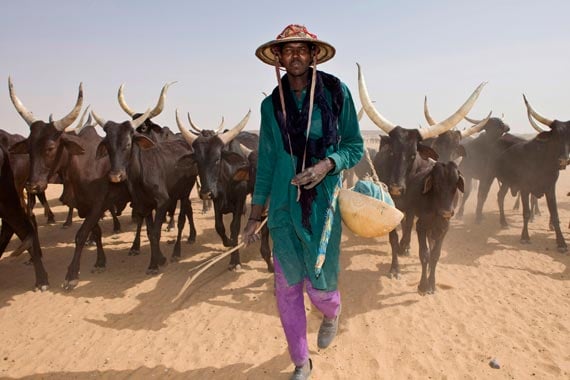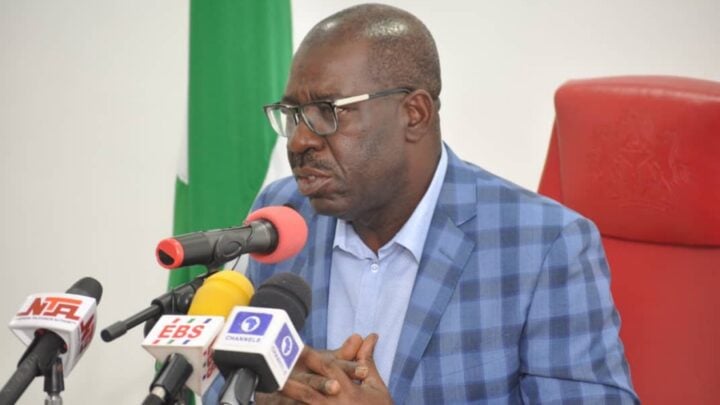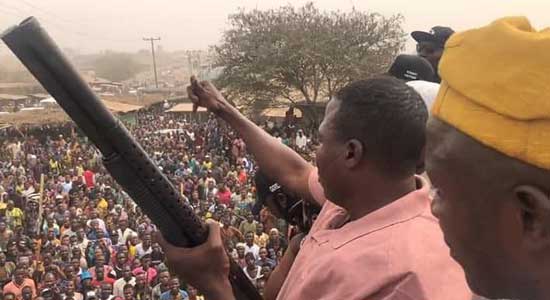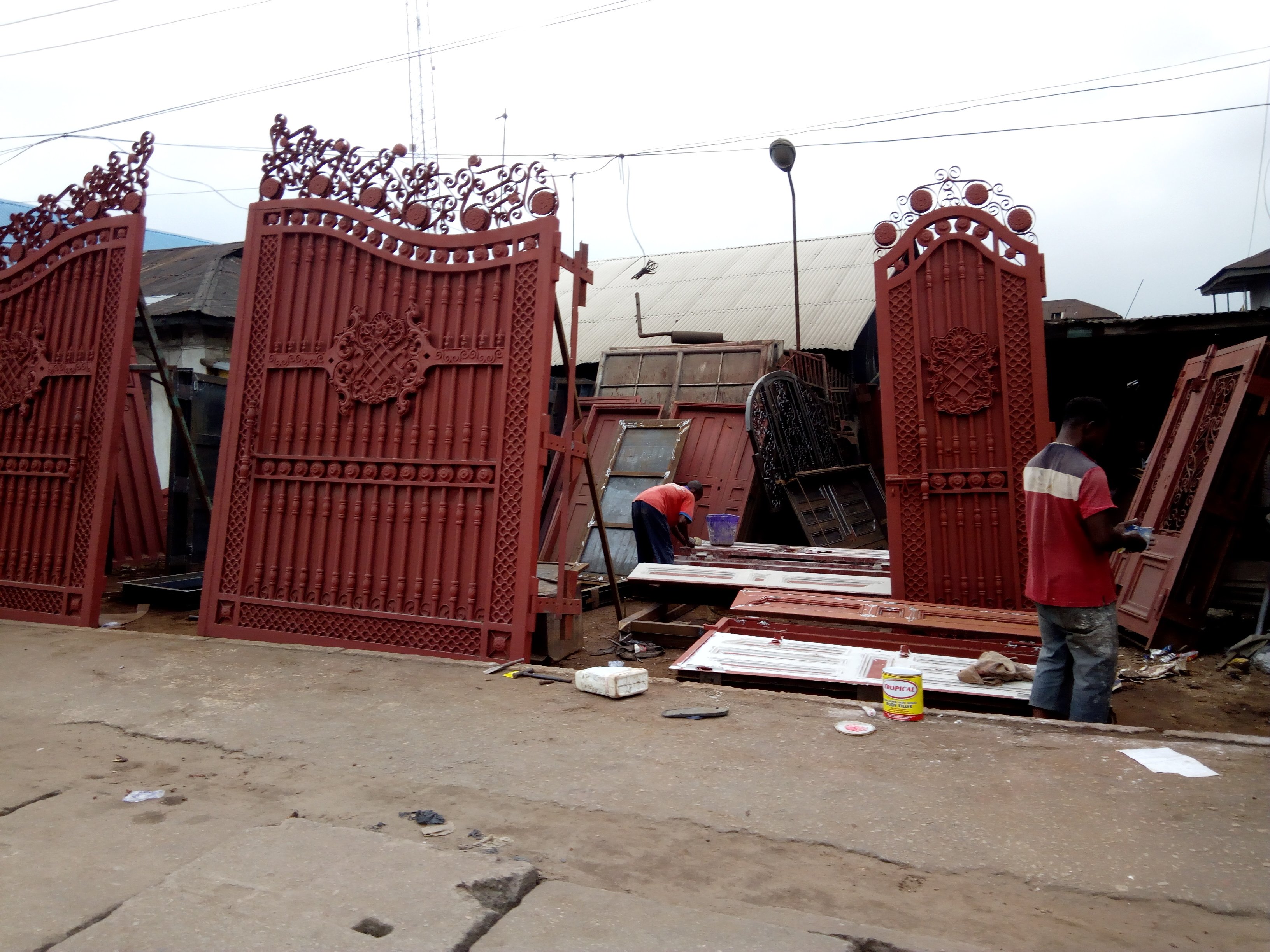Oyin Adejobi, late Yoruba cripple thespian, renowned for his famous African alternative dispute resolution drama sketches called Kootu Asipa of the 1980s, once allegorized the story of how he became disabled. In Orogun Adedigba, (the wicked co-wife) an autobiographical movie, Adejobi narrativized how his mother’s jealously wicked co-wife puffed up the fire of a destructive potion that immobilized him for life. That singular malediction became the burden Adejobi shouldered for his 74 years on earth. Though the Osogbo-born thespian’s stepmother’s potion succeeded in crippling him, it couldn’t stop the realization of his life’s attainment. Iconoclastic Yoruba Kennery brand music lord, Orlando Owo’s Itan Orogun Meji (the story of two co-wives) also explains the concept of a polygamous home’s squabbles.
Owo, the nonconformist musician’s narrative goes thus: Two co-wives in polygamy, in a traditional African Yoruba home, were engaged in spirited scuffles for the heart of their joint household. One day, the eldest wife conspired to kill the son of her co-wife, simply because he was more brilliant than hers. She cooked a portage delicacy served on two different plates. One, which was invitingly reddish and garnished with condiments, was sauced with a killer potion while the second plate, bereft of any poison, was whitish and uninviting. As the children of the two women arrived from school, they headed for the plates of food. While the son of the woman who hewn the death drama picked the reddish but poisoned plate, her stepson picked the one without. The malefactor’s son dies but the co-wife’s immediately went to the local football field and went a-playing football. Owo’s moral is similar to that in Bob Marley’s Small Axe track (by the way, happy posthumous anniversary to Bob. If he were alive, he would have been 76 on Saturday). They both teach that anyone who contrives calamity for his fellow man would soon pick its evil faggots, or what Marley termed “whosoever diggeth a pit, shall fall in it.”
Northern and Southern Nigeria are the proverbial co-wives in a polygamous home, A home always replete with commotion, tension is visible at the moment. There is a cow war. Are you a doctor who frequently watches patients’ throes as they wangle through their last breaths? Or, you were old enough to witness the fire and brimstones hauled at each other by Eastern and Northern Nigerian centrifugal forces in July 1967, prior to Chuwuemeka Odumegwu Ojukwu’s declaration of a state of Biafra? Nigeria personifies the last breaths in those narratives. For those who live within Nigeria’s borders today or who live without but regularly scoop up daily saber-rattling effusions from Nigeria, de ja vu is the eerie feeling. In their subconscious, they reckon that they had been here before. It is like a voyage through Nigeria’s jungle past, arriving at a hostile present.
In typical polygamy, illogical, selfish, and self-centered postulations are always fired. It is like hot artillery fires. As Ojukwu hauled his, they were repelled by more destructive canons from the western and northern flanks. Perhaps because they were soldiers, their exchanges were uncivil and lacked a human touch. Fast-forward to January 1970. Over a million people martyred to selfish ego and senseless tribal nationalism, millions of dollars propitiated by the groove of a blood-thirsty god of war, the two sides concluded that the spillages could have been averted at a peace table.
Advertisement
In 1950s Nigeria, under Ahmadu Bello and Tafawa Balewa, his Prime Minister surrogate, Nigeria’s ethnic disagreements reached their zenith. Palpable ethnic tension was the code of relationship. The north was terribly afraid of the southern head-start in the field of education which it felt conferred developmental advantages. Southern Nigeria also feared that the north’s geographical advantage and its disadvantageous fraternalism with British colonialists could make an intellectual weakling the valiant. Time proved it right after all. Though the 1946 Richards constitution allowed the three regions to develop at their own paces, mutual suspicions defined the relationships as in polygamy. The Orogun adedigba syndrome made Balewa and Bello to side with Premier S.L. Akintola in the Western Nigerian crisis, against the Obafemi Awolowo group. It was as if they took pleasure in and sought a nihilistic end for their highly hated western region. It provoked Michael Okpara, Eastern Premier, his region and the rump of Action Group in the west to jointly fight the wicked co-wife called the northern hegemons. The ethnic tension, rather than abate, grew over the decades. Even years of military rule, led by northern military coup plotters, savoured by a sprinkle of southern officers, couldn’t tame the tension.
Today under Muhammadu Buhari, Nigeria has taken ten steps backwards to the period of 1950s and 1960s. Unless it is a matter of life and death, it is almost an unconscionable plunge for any southerner to undertake a journey to the north today. Fear of a rekindling of the 1966 pogrom is the beginning of wisdom. That pogrom was a series of mindless massacres perpetrated against Igbo and other sympathetic ethnic groups of southern Nigeria who lived in northern Nigeria. It began in May of that year and by September 29, 1966, an estimated 8,000 to 30,000 Igbo/easterners and their southern sympathizers had been butchered.
Unlike the spat of the 1950s/1960s, today’s impending war cries have nothing to do with the spatial contest with the north over its unfair dominance of the political space. It is about cows – cattle – and where they should graze. While Rwanda is carving new dominance in technology and the world is going to space, Nigeria’s internal squabble is cattle territory.
Advertisement
Yes, the nationalism of Fulani tribesmen has engaged literature over the years. In 1985 as Head of State, Buhari voted against Nigerian Igbo man, Peter Onu, who was vying for OAU’s Secretary-General position, choosing instead to vote his Fulani brother, Ude Oumarou. Oumarou, born in N’Dounga in the Niger Republic in 1937, was a Nigerien diplomat, government minister, as well as a journalist. He was Niger’s ambassador to the United Nations from 1980 to 1983 and served as the country’s foreign minister between 1983 and 1985. No thanks to Buhari’s vote, he later became the Secretary-General of the OAU and served between 1985 and 1988. He died on February 12, 2002. Nwalimu Julius Nyerere, late Tanzanian leader, could not stomach this scum of a stab of the Nigerian people and openly berated Major General Buhari for that spineless betrayal.
We didn’t however know that this Fulani nationalism was this iniquitously pervasive and destructively genetic. Its metastasis is so bad that a Nigerian president would wangle in spaces for foreign members of his Fulani kindred in the geographical territory of the place he administers. He never utters a word while these same people kill his Nigerian constituents. It is something in the mold of a contrived Olusegun Obasanjo, as Nigerian president, because he is Yoruba, forcefully using his presidential powers to seek spaces in Yobe State for his Beninese brethren who speak fluent Yoruba, sing/dance Bolojo traditional song more than even his brother in Ipokia, Ogun State and practice same traditional religion that can be found in Yorubaland. And on top of it, look the other way if they kill, maim and rape his Northern Nigerian brothers and sisters in that Nigerian territory. It is eerily curious. A scriptwriter would need a vastly fertile mind to concoct such a weird scenario. But that is Nigeria’s lot in the hands of Buhari.
Estimated to be about 38 million, Fulani are spread across West Africa, beginning from Senegal to the Central African Republic. They live in numerous countries in Africa which range from Nigeria, Guinea, Guinea-Bissau, Cameroon, Senegal, The Gambia, Mali, Niger, Burkina Faso, Ghana, Sudan, Chad, Mauritania, among many others. They even represent between 32.1% and 40% of the population in Guinea. One noticeable feature of theirs is also that they are ultra-violent. In 2014, their violence in Nigeria was ranked fourth most deadly in the world. Just like in Nigeria, Fulani of Mali were accused of herding their cattle onto farms and destroying crops. In March, 2019, irked by their repugnant insolence and audacity, the Mali’s Dogon ethnic group slaughtered more than 130 Fulani herdsmen, in the yet most deadly riposte ever. Earlier in 2018, 202 were killed in the same Mali’s Mopti region.
Buhari has sought land for these same people in Nigeria through his RUGA policy and protection for them through the Water Resources Bill. He and his aides have told Nigerians repeatedly that these itinerant Fula pastoralists, who have no passport or any immigration clearance, can live in any part of Nigeria. Caring less whose ox was gored, his kin in Niger were the first he visited immediately he was made president in 2015. In September 2020, Buhari’s Federal Executive Council approved the sum of $2 billion for the construction of a rail line from Kano to Maradi in Niger Republic. If Nigerians know Buhari’s huge infrastructural spending in Niger Republic, we probably will collapse. In February last year, his government announced that it would construct $81 million worth of road network from Sokoto, Jigawa down to Niger Republic. In April 2018, it also said that it would be collaborating with Niger to build a $2billion refinery to be located in Niger. Justifying the influx of criminal elements from Niger to Nigeria, he recently said that only God could protect that route from criminals.
Advertisement
What kind of human being justifies killings and pains inflicted on his fellow man? It is only on the Animal TV Channel that one would think this was excusable and practicable. But no, northern elders have proven that that Animal Channel trait isn’t an exclusive preserve of the carnivorous fauna society. For more than half a century, Yoruba have lived peaceably with Fulani herders. In some northern parts of Oyo State, especially those who trace their progeny to Ibaribaland, intermarriages of decades have subsisted. Many of these so-called Yoruba there have a mixture of Fulani/Yoruba blood. Fulani are councilors in local councils in the area and fight for political space to be chairmen. They speak Yoruba more than they do their own Fulani. Now that an influx of their murderous Fula kin have infiltrated the people’s land, destroying crops, raping women and visiting unknown banditry on the people as they did to the Dogon of Central Mali, it is only logical that this violent variant of Fulani be flushed out from Yorubaland. Policemen would not lift a finger against these lords of the manor as they are the president’s kinsmen. There is nowhere that they have ever been convicted for their crimes. It is only logical for the law not to prosecute kin of an Almighty Buhari who, about two decades ago, stormed same Oyo State as the champion of the rights of “his people” being killed “by your people.”
In all this, Yoruba’s Northern Orogun adedigba and their elders never raised their voices against the villainy of the Fulani. When their fly was feasting on the Yoruba wound, it was desirable to keep mute but when the victim started to masticate the offending fly, all hell is now let loose. Now that the Yoruba have had a fill of the Fulani violence and are asking their murderous guests to leave them in peace, a cacophony of sickening, self-centered cries is flying in the firmament. The Northern Elders Forum (NEF) was the first to grump. Last week, it worried over ejection notices given to Fulani herders and their families in some states of the south. No one heard NEF upbraid Fulani when they embarked on their spate of murders.
Enters Nasir el-Rufai, the Kaduna State governor. Under him, Fulani have allegedly killed Southern Kaduna indigenes probably in proportion to the casualties of the Nigerian civil war. Now, el-Rufai is preaching against anarchy. This is simply because his Fula kindred have been asked to leave Yorubaland for peace to reign. In a statement he issued last week, el-Rufai expressed worry over video clips he said were circulating on the social media, even though he said he had not seen any himself, of how his people were being “massacred and their property destroyed.” These were one of the same set of people who claimed that the word “massacre” by soldiers was inappropriate for the Lekki Toll Gate killings. Now, el-Rufai is bothered about “avoidable rhetoric, frenzied ethnic profiling” and the place of the law in human killings. Neither he nor Buhari has expressed disgust at the broad daylight rape and killing of Yoruba by Fulani herdsmen.
Restructuring in a properly practiced federal Nigeria, akin to the two Orogun adedigba living in their different abodes, working for their individual survival and sustenance and being given their dues by their superintending husband, is the only remedy to this quarrelsome togetherness. That is if the two troublous wives won’t go their separate ways.
Advertisement
IGP: Trapped in Gongosu and Edidare kingdom
Last week, President Muhammadu Buhari extended the tenure of office of the Inspector General of Police (IGP), Mohammed Adamu by three months. He also nominated erstwhile service chiefs to the Senate as non-career ambassadors-designate. The nominees are: Gen Abayomi G. Olonisakin (rtd), Lt Gen Tukur Y. Buratai (Rtd), Vice Admiral Ibok-Ete Ibas (rtd), Air Marshal Sadique Abubakar (rtd), and Air Vice Marshal Mohammed S. Usman (rtd).
Advertisement
The extension of the IG’s tenure was announced by the Minister of Police Affairs, Mohammad Dingyadi. He said Buhari found the elongation of the IGP’s tenure necessary so as to ensure a robust and efficient process of the appointment of a new IG. “This is not unconnected to the desire of Mr. President to, not only have a smooth handover but to also ensure the right officer is appointed into that position. Mr President is extending by three months to allow him to get into the process of appointing a new one.” The extension didn’t create any systemic lacuna, said Dingyadi and he reminded every dissenting voice that the extension was within the President’s constitutional prerogative to so do.
The president’s twin actions took me on an immediate shuttle into D.O. Fagunwa’s classic, Ogboju Ode Ninu Igbo Irunmole (brave hunter in a forest of a thousand daemons) where Yoruba’s own Charles Dickens told the story of a town inhabited by fools called Edidare and where a sophisticatedly talented fool was their king. Rotimi Ogunjobi, in his Edidare, an epic poem, even took the Fagunwa epic a notch further. In the poem, Ogunjobi carved the burlesque of a deteriorating country of Edidare, with Omugodimeta (triply idiotic man) as their king. The country of Èdìdàré carved by Ogunjobi’s pen reeks of indescribable filth and its inhabitants’ suffering and hopeless existence under a dynasty of idiotic kings and gluttonous parliamentarians are mind-boggling. The vices of their kings are of epidemic proportion and they govern with unchivalrous stupidity.
Advertisement
After reading the story of the government’s two decisions last week, I was transfixed. I wasn’t sure that I had not, all of a sudden, gone on a visit to the country of Edidare. I began to commune with Fagunwa and Ogunjobi’s fictive Gongosu and Omugodimeji characters, seeking who exactly was the exact replica here. Do the people in authority not believe that Nigerians are inhabitants of Edidare and that we are a coterie of idiots who have no propensity to think for ourselves?
How did Buhari, with a presidential history of being decidedly laid back and who drawls in presidential policies like okra soup, suddenly take on the hubris of a cheetah, when it came to Buratai and co? A man who didn’t nominate ministers for six months, who has found his nominees to be cousins of Angel Gabriel, so much that none of them has been found wanting in almost six years of being in office, suddenly nominated service chiefs he removed as ambassadors, all taking place in less than 78 hours! If Nigeria was not Edidare, why would his police chief, who had served for 35 years and whose date of retirement didn’t just happen, need three more months “to allow him to get into the process of appointing a new one?” In a country, not Edidare, shouldn’t notice of Adamu’s retirement not be on the president’s table with an alarm buzzing, a year before the date?
Advertisement
Again, what could have got the Nigerian okra presidency to nominate service chiefs who overstayed in office for about five years apiece, spending 36-40 years in office, 78 hours after their sack, as ambassadors? If we were not a country of Edidare, the jigsaw puzzle of why this cheetah speed nomination had to come should by now have unraveled. Same with why Buhari embarrassingly delayed their removal, years more than the norm. The fear of the International Criminal Court (ICC) is the beginning of Buhari’s wisdom! Only Edidare people would not know that by giving Buratai and others diplomatic duvet to cover their heads against trial for alleged crimes against humanity, the king hoped that they would not be tried in Hague.
But how does Buratai, who earlier called the bluff of ICC, hope to live outside the country? In October last year, he had said: “Criminal elements are threatening us with travel ban but we are not worried because we must remain in this country to make it better. The first time I travelled outside of this country, I was already 50 years and a General, so I don’t mind if I live the rest of my life here.”
So, the General didn’t also go to Dubai, his Dubai, all these years? Archivists have however put a lie to the Buratai claim. If you ask me, I think the joke of the king is actually on us. If we are not a people living in Edidare, we should tell the king that we know the contours of his lies.
Muyiwa Esho: Akure’s peacock who died with its beautiful plume
On Friday this week, the feet of all Akure sons and daughters, as well as their friends, will take languid walks to Akure, Ondo State. No, not to celebrate the yearly Ulefunta Festival with the Deji of Akure. They will be in the Ondo State capital to commit our brother, my fan and President of Ooye Development Initiative (ODI) to mother earth. Olumuyiwa Esho is dead. Boda Muyiwa will return to the city of his birth in a hearse, ramrod stiff and still, his hands clad to his waist as if in a military salute to Asodeboyede, the progenitor of Akure Kingdom. He will do it like the Eshos (Generalissimos) did in ancient Yoruba traditional society. Boda Muyiwa is dead. Dead to a thousand dirges and invocations of his noble assignment here on earth.
Since that Sunday morning of January 24, 2021, when the ears-shattering message that he passed on that morning in Lagos sieved into my ears, recovery has been very hard. So have virtually all who knew him. We had met in Akure on December 28, 2020, in his palatial house in Alagbaka. He was our brand new President at ODI and had gathered us all to deliberate on his new assignment. Face masks that we stuck to our faces literally and apparently blinded us from seeing that it was a modest funeral Esho organized in his own memory.
A few days earlier, we had unanimously proclaimed him President in absentia. In subsequent banters with us on our Group’s Whatsapp medium, he had wondered what qualified him to be thus chosen. Was it his wealth or age? None, we chorused. That he schooled at the prestigious Aquinas College, Akure from January 1973 to June 1977? No! Not even his 30 years work that spanned from 1986 to 2016 with The Shell Petroleum Development Company of Nigeria in Port-Harcourt, Warri and Lagos, nor an overseas working assignment he had with Shell International Exploration and Production B.V. (SIEP), The Hague, The Netherland and Shell Woodcreek Campus, Houston, TX, USA from 2002 to 2004. We told him that his illustrious working career with Shell which began as Wellsite Petroleum Engineer, as well as the technical and leadership professional exposures in Geophysics, Petrophysics and finally as Business Opportunity Manager, even as he retired in 2016, was not our fascination. It could not have been on account of his brilliance or appointment in 2017 as Technical Manager with Brass Fertilizer, which he did until he died. His Akure-ness was his qualification.
On that day in his house, waxing lyrical about his plans for the development of Akure, Boda Muyiwa mapped out strategic plans to ensure that Akure took its place in the scheme of things. For instance, he literally swore that never would the ancient town play the second fiddle again and said that the kingdom had enough human resources to take its rightful place, socially, politically and in all other spheres. He promised to deploy his personal resources in this bid and lead from the front. He assured us that he would personally march to all the nooks and crannies of the kingdom to fight that divisive spirit that tore Akure apart. We never knew that he was merely skirting the path for us to tread, hiding from us the fact that he would presently be leaving this world.
Muyiwa Esho loved Akure. This was obvious in the way he ‘blew’ the dialect at random. He gave all he had for the wellness of the land and good of its people. At his valediction that we erroneously thought was a meeting to project his presidency, as if deliberately telling me, he narrated the story of a young girl he chose to train to the university, among others, all of whom he didn’t have physical dealings with but funneled their finance through his uncle. People lifted him to where he was too, he announced and thus, he believed in raising humanity from their knees.
Boda Muyiwa, erroneously believing I had decades to live with you, I always forgot to ask you this question: Did you love Ayinla Omowura that profoundly or it was your brother who authored his biography that you loved? The tenacity with which you demanded an autographed copy of the late Yoruba musician’s biography was jaws dropping, especially for a top oil sector-top shot like you. When you eventually got a copy, the optics of the physical thumb-up you gave me will forever be evergreen in my memory.
On Friday, Akure will inter Boda Muyiwa, our own beautiful peacock, with its adorable plumage. We will fight back tears as we behold the good man who loved to do good for the collective, locked up in a lonely casket.
As highly as the Deji adored you, Boda Muyiwa, he cannot be at your funeral because he cannot behold the dead. Rest in power, an icon of Akure Kingdom, Omo Owa, Omo Ekun.
Views expressed by contributors are strictly personal and not of TheCable.






